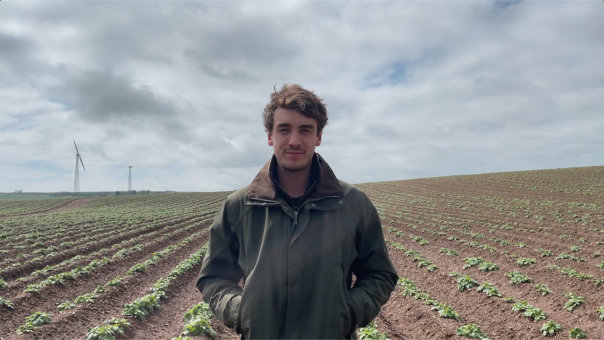
This transition aims to restore and protect soil health as well as looking to natural processes to control pests, prevent plant disease and strengthen crops against severe weather events.
Max Koeune, chief executive at McCain, said: “The pandemic has put a spotlight squarely on the precarious nature of our global food system. But the largest challenges we face are related to climate change.
“It’s estimated that a quarter of man-made carbon emissions come from the production of food, and if we have to grow more food to feed more people, that will only intensify. If we don’t transform the way we grow food, the whole system is at risk of suffering irreparable damage.
“Our belief in Regenerative agriculture goes back to our roots as a farm business. As a global leader in food production, McCain has a responsibility to re-imagine the way we grow a potato in a way that is beneficial for both the planet, and the communities where we operate. We have to act today to make things better tomorrow.”
McCain’s annual Global Sustainability Report tracks the progress of commitments made in its initial sustainability report issued last year, and makes a series of new commitments to help it move towards its climate objectives.
James Pick, a 22-year-old potato farmer for McCain based in North Yorkshire, added: “The benefits of regenerative farming are clear, improving soil health, increasing biodiversity, and reducing greenhouse gas emissions, all play an incredibly important role in helping the farm ecosystem and improving our environment. It’s why I’m so proud to be collaborating with McCain to reach the commitment announced today.
“The commitment to regenerative farming that McCain are making is not simply something that will help me produce in the short-term, but it will protect the land I farm for the future, ensuring I can pass this farm down to future generations for years to come.”
In August 2020 McCain CG&I pledged an investment of £25m to the British potato industry to help farmers manage the erratic weather caused by climate change as well as the impact of the Covid-19 pandemic.
McCain has pledged to:
• Opening three Farms of the Future in different growing regions around the world by 2025.
• Reducing carbon emissions from potato farming, storage and freight by 25% by 2030.
• Reducing carbon emissions from all operations by 50% by 2030.
• Moving to 100% renewable electricity by 2030.
• Using 100% of every potato harvested.
• Sending zero waste to landfills by 2025.
• Removing palm oil from all McCain branded products by 2025.
• Making 100% of packaging recyclable, reusable or compostable by 2025.
• Donating 200 million meals to global foodbanks and NGOs by 2025.
Howard Snape, regional president at McCain GB & Ireland, commented: “We are committed to helping and protecting British potato growers to ensure the long-term sustainability of the potato crop.
“The impacts of climate change are all too real and our farmers have been hit immensely hard in recent years having faced a major drought and the wettest harvest on record. This announcement will be critical in helping us reduce our collective carbon footprint, whilst building a resilient supply chain in which everyone can thrive.”
So far McCain has achieved:
- A 6% reduction in absolute carbon emissions across the company’s global operations.
- A 2% decrease in water use in water-stressed regions.
- A 5% increase in use of renewable electricity.
- Donating 53 million meals — an estimated 16,000 tonnes of food — to foodbanks and NGOs worldwide throughout 2020.